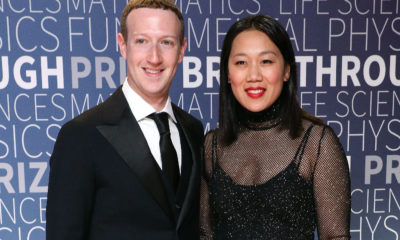World
At Facebook, new dads to get four-month paternity leave

New York: When soon-to-be-dad Facebook CEO Mark Zuckerberg decided to go on two-months’ paternity leave before his daughter is due, the corporate world took notice. Now the four-month paid paternal leave policy for US employees has been extended to all full-time Facebook employees, regardless of gender or location.
Announcing this via a Facebook post, Lori Matloff Goler, head of human resource at the company, said that the expanded benefit primarily affects new fathers and people in same-sex relationships outside the US.
“I am proud to announce that we are extending our parental leave policy for full time employees to cover four months of paid baby leave for all new parents, no matter their gender or where in the world they live,” she posted.
“It will not alter the existing maternity leave currently available to all employees worldwide,” she added.
“Studies show that when working parents take time to be with their newborns, outcomes are better for the children and families,” Zuckerberg had posted earlier, sparking a fury of responses and nearly 70,000 likes in just an hour from his nearly 42 million Facebook followers.
According to Pew Research, almost half of fathers are worried that they do not spend enough time with their children.
“Starting on January 1, 2016, all new dads and same-sex partners at Facebook will receive four months of paid leave to bond with a new baby, whether they are the primary caregiver or not,” Goler announced.
“All new parents in all of our offices worldwide, including those who had or adopted a baby in 2015 and were Facebook employees at the time, will be eligible,” she added.
The leave can be taken at any point up to a year after the baby is born.
“Taking parental leave is a very personal decision, but we want to be able to provide our people with the support and flexibility to take the time they need,” the Facebook HR head posted.
“Our approach to benefits at Facebook is to support our employees and the people who matter most to them. We want to be there for our people at all stages of life, and in particular we strive to be a leading place to work for families. An important part of this is offering paid parental or ‘baby’ leave,” she further wrote.
The Facebook CEO has not revealed when his daughter is due. He will be taking about half the four months of leave Facebook typically offered to new parents.
Facebook policy allows him take another two months during the first year of his daughter’s life.
By comparison, Netflix allows up to a year, Google up to 18 weeks and Microsoft 12 weeks.
Studies show that when working parents take time to be with their newborns, outcomes are better for the children and families.
For too long, paid baby leave has been granted only to a mother who is giving birth.
“We believe that fathers and mothers alike deserve the same level of support when they are starting and growing a family, regardless of how they define family,” Goler posted.
World
Lockdowns in China Force Urban Communities to Defy Censorship and Vent Frustration Online

Shanghai’s rich middle class is leading a wave of online dissent over the strict and prolonged lockdowns imposed in various parts of the country. Chinese internet censorship is struggling as patience is wearing thin in many urban centers, coming up with creative forms of online protests.
Social Media Posts Revealing Lockdown Tension in Shanghai
Drawn-out lockdowns are nothing new in China as authorities insist with the nation’s zero-Covid policy since the start of the pandemic. Currently over This time around, however, metropolitan areas like Shanghai are increasingly difficult to keep quiet, given that its more than 25 million residents have seen weeks of total isolation along with food shortages and many other service interruptions.
Dozens of towns and reportedly over 300 million Chinese citizens have been affected by lockdowns of different severity. As expected, urban netizens have been most outspoken over their difficulties by finding creative ways to get around state censorship and bans placed on topics, news comments and spontaneous campaigns.
Shanghai residents have been using mobile proxies and hijacking seemingly unrelated hashtags to talk about healthcare issues, delivery failures and the overall severity of their situation. The “positive energy” that the Chinese government wants to transmit during the recent prolonged series of lockdowns does not come naturally to those counting food supplies and online censors are working hard to filter words, trending topics and undesired social media sharing.
WeChat groups and message threads are under constant monitoring. Posts questioning the zero-Covid approach have been quickly deleted, including by leading Chinese health experts like Dr. Zhong Nanshan. Video footage is soon censored and protests and investigations are quickly made to disappear.
Where this has not worked, officials have exposed banners with warnings and outright threats like “watch your own mouth or face punishment”, while drones have been patrolling the city skies. Yet, if anything, this has led to further tensions and unspoken confrontation with Shanghai’s educated and affluent middle class.
Creative Online Solutions Harnessing Civic Energy
Announcements by Chinese social media that they would be publishing the IP addresses of users who “spread rumors” have not helped either. Tech industry research has shown that much of Asia’s tech-savvy population has a habit of using mobile proxies and other privacy tools, quickly finding workarounds to browse the internet freely and talk to the world about the hottest topics.
The sheer volume of forbidden posts is already a challenge for the very censorship system, experts explain. Unable to track all trending hashtags, state workers overlook topics that speak about the US, Ukraine or other popular news. Linking human rights elsewhere to their situation, Chinese online dissidents establish their informal channels and “hijack” the conversation to share personal or publicly relevant information about the Covid suppression in their town.
Sarcastic and satirical posts still dominate. Others hope to evade the censors by replacing words from famous poems or the national anthem. One thing is certain – social media, when harnessed with the right creativity, has proven its ability to mount pressure on the government in even some of the most strictly controlled tech environments like China.























